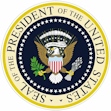The Constitution of the United States of America defines the office of the President.
Article II states that the executive power shall be vested in a President that shall hold office during a term of four years, defines Presidential powers as Commander in Chief of the armed forces and the Militia of the several states, requires that the President from time to time give the Congress information of the State of the Union, and defines how the President and others may be removed from office upon impeachment and conviction of treason, bribery, and other high crimes and misdemeanors.
| American Presidents |
| Number |
|
President |
Years |
Performance Rating |
Events and Accomplishments During Term of Office |
| 1 |
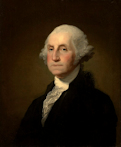 |
George Washington |
1789-1797 |
A |
Washington was born in 1732 into a wealthy planter family in the British Colony of Virginia. During the War of Independence (1775-1783), Washington was Commander-in-Chief of the Continental Army, a volunteer force of colonial citizen-soldiers that he led to victory against the most powerful military on Earth. He was unanimously elected to be the first President of the United States. When Washigton became President in 1789, the states constituting the United States were Delaware, Pennsylvania, New Jersey, Georgia, Connecticut, Massachusetts, Maryland, South Carolina, New Hampshire, Virginia, and New York. During his term in office the states of North Carolina, Rhode Island, Vermont, Kentucky, and Tennessee were added. The Presidential residence moved from New York City to Philadelphia in 1790. Washington was 6 ft, 3 in tall. He fought uprisings by the Western Confederacy of Indian tribes and used naval forces against the Barbary Pirates, Muslims who operated in the western Mediterranean. Showing a natural flair for statesmanship, Washington fashioned an effective working relationship between the Presidency, Congress, and the Supreme Court, and with foreign nations. He established many precedents that guided his successors, including creating a cabinet, using the veto, and asserting executive privilege. He supported Alexander Hamilton's economic policies, whereby the federal government assumed the debts of the state governments and established the First Bank of the United States, the United States Mint, and the Customs Service. |
| 2 |
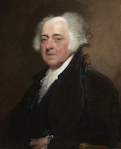 |
John Adams |
1797-1801 |
B |
Adams was born in 1735 on his family's farm in Braintree, on the British Colony of Massachusetts. He was a delegate from Massachusetts to the Continental Congress. Adams was Vice President 1789-1797. When he became President two political parties emerged. Democratic-Republicans favored state rights and a limited role for the Federal government. Federalists like Adams wanted a strong central government. European conflicts between France and Britain caused problems for the United States. Intending to discourage foreign agents in the country, Congress passed the Alien and Sedition Acts. American warships fought an undeclared war against French privateers interfering with American shipping, but negotiations eventually brought about a peaceful resolution. |
| 3 |
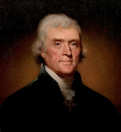 |
Thomas Jefferson |
1801-1809 |
A |
Born in 1743 on his father's plantation at Shadwell, Virginia, Jefferson inherited a 5,000 acre estate. He attended the College of William and Mary and later read law with the prominent jurist George Wythe. He began a practice as a lawyer in 1767 and was elected to the House of Burgesses (legislature) in colonial Virginia. Jefferson was a member of the Continental Congress and was chosen to draft the Declaration of Independence. He was Secretary of State during Washington's administration. A member of the Democratic-Republican Party, Jefferson was inaugurated President on March 4, 1801. Jefferson negotiated the Louisiana Purchase, which essentially doubled the land area of the United States. In exchange for $15 million, the United States received the Louisiana territory from France. Jefferson authorized the Lewis and Clark expedition to find means for direct and practicable trans-continental communication to promote commerce. In 1807 Jefferson signed a law, which took effect on January 1, 1808, that banned the importation of enslaved people to the United States. The Barbary Coast Pirates continued abductions and raids on shipping. The state of Ohio was admitted to the United States in 1803. |
| 4 |
 |
James Madison |
1809-1817 |
A |
Madison was born and grew up in Virginia and was a major contributor to the U.S. Constitution. He was a member of the Democratic-Republican party and was inaugurated as President in 1809. Madison's wife, Dolley, excelled at hosting important political occasions, and helped to establish the role of the first lady of the United States in the social affairs of the nation. Following harassment of American ships by British forces, on 1812 the United States declared war on Great Britain. The British responded by raiding Washington, D.C. In late 1811 the United States defeated forces led by Indian leader Tecumseh, a British ally, at the battle of Tippecanoe. In January 1815, General Andrew Jackson led an American force that defeated the British at the Battle of New Orleans, and soon later Madison's negotiators reached the Treaty of Ghent, ending the war with Great Britain without either side making major concessions. Madison proposed re-establishing a national bank, called for increased spending on the army and navy, a tariff protecting American goods from foreign competition, and a constitutional amendment authorizing the federal government funding for the construction of works such as roads and canals. Congress enacted the Tariff of 1816, setting high import duties for goods produced outside the United States, and granted the Second Bank of the United States a twenty-five-year charter. Madison supported improved access to western lands and approved federal funding for the Cumberland Road. Madison was 5 ft, 4 in tall and weighed about 100 pounds. The states of Louisiana and Indiana were admitted to the United States during his term in office. |
| 5 |
 |
James Monroe |
1817-1825 |
B |
Monroe was born in 1758, in Westmoreland County, Virginia. His father was a planter and carpenter. Monroe attended the College of William and Mary and during the War of Independence served in the Continental Army and as a Colonel in the Virginia militia. He was elected Governor of Virginia in 1799. Monroe, a Republican, was inaugurated as President of the United States on March 4, 1817. The Missouri Compromise admitted Maine to the U.S. as a no-slavery state and Missouri as a slave state, and restricted new slaveholding states to areas south of the 36.5 deg parallel, the boundary between Virginia and North Carolina. In addition to Maine and Missouri, the states of Mississippi, Illinois, and Alabama were admitted to the United States during Monroe's administration. In 1819, Spain ceded Florida to the United States in exchange for the assumption of $5 million of claims by American citizens against Spain. Monroe established the Monroe doctrine, whereby the United States would avoid involvement in European affairs, while it would oppose interference or control by any nation in the Americas. |
| 6 |
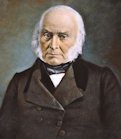 |
John Quincy Adams |
1825-1829 |
C |
John Quincy Adams was born in 1767 at Braintree, Massachusetts. He graduated from Harvard College in 1787 and studied law, opening his legal practice in Boston in 1790. Before he became President in 1825, John Quincy Adams was Secretary of State 1817-1825. The son of John Adams, he was a member of the Whig party. He favored a strong federal government and central planning. Adams won congressional approval of ambitious infrastructure projects and expanded international trade, but failed in his attempts to establish a national observatory and a national university. After losing his campaign for reelection, Adams refused to attend the 1829 inauguration of Andrew Jackson. |
| 7 |
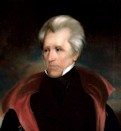 |
Andrew Jackson |
1829-1837 |
A |
Jackson was born on March 15, 1767, in the Waxhaws region straddling the border of South and North Carolina. A Democrat, Jackson had a brilliant career as an Army general and served in the U.S. House and Senate. He was inaugurated as President on March 4, 1829. He favored a streamlined laissez-faire federal government that was frugal and nationalist. His bold and assertive style rankled political enemies, while his thoughtful economic policies allowed him to pay off all the national debt. The Indian Removal Act of 1830 authorized the negotiated relocation of southern American Indian tribes to western federal territories and facilitated the settlement of white immigrants. The states of Arkansas and Michigan were added to the United States during Jackson's term in office. |
| 8 |
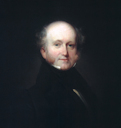 |
Martin Van Buren |
1837-1841 |
C |
Van Buren was born in 1782, in Kinderhook, New York. He was raised speaking primarily Dutch and learned English while attending school. Van Buren studied law and worked as a lawyer after obtaining his law license. Soon after taking office in 1837 Van Buren was faced by the financial panic of 1837, a downward phase of a boom-and-bust economic cycle driven by earlier easy bank credit and wild speculation in western lands. Van Buren's deflationary policy, drastically reducing government expenditures, served to exacerbate the depression. Hundreds of businesses and banks failed. In 1837, Canadians unhappy with the British administration moved into New York and prepared an armed insurrection to form a Republic of Canada. When British troops crossed the border and put down the rebellion, American sentiment favored an armed retaliation, but Van Buren used diplomacy to deescalate the situation and announced a policy of neutrality regarding Canadian independence. An abolitionist, Van Buren blocked the annexation of Texas, because he thought it would add to slave territory -- this did not endear him to the southern wing of his Democratic party. He lost the 1840 election to William Henry Harrison. |
| 9 |
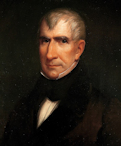 |
William Henry Harrison |
1841 |
I |
Harrison was born in 1773 in Virginia. He joined the Army in 1791 and participated in the Northwest Indian War, rising to the rank of Captain in 1797. Harrison served in the U.S. House of Representatives 1816-1819, and as U.S. Senator from Ohio 1825-1828. A member of the Whig party, Harrison defeated Van Buren in the 1840 Presidential election. During the Presidential campaign Harrison moved across the country, in contrast to Van Buren, who stayed at the White House. Although wealthy, Harrison's campaign presented him as a common man, a frontiersman with an impeccable military record that would rescue the country from the economic depression that followed the panic of 1837. He was a champion of state rights, and indicated he would defer to Congress on legislative matters. At age 68, Harrison was the oldest man elected President when he took office March 4, 1841. He fell ill three weeks after his inauguration, and died a week later. |
| 10 |
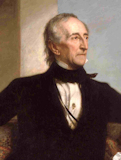 |
John Tyler |
1841-1845 |
B |
Tyler was born in 1790 in Charles City County, Virginia. He graduated from the College of William and Mary in 1807 and practiced law in Richmond, Virginia. Tyler served in the U.S. House of Representatives 1816-1821, as Governor of Virginia 1825-1827, and as U.S. Senator from Virginia 1827-1836. He won the Whig Party nomination as U.S. Vice President in the 1840 general election and was inaugurated as Vice President on March 4, 1841. Tyler became U.S. President on April 4, 1841, after Harrison's death. A supporter of states rights, Tyler vetoed bills to create a national bank and to increase tariffs. The Webster-Ashburton Treaty of 1842 resolved border disputes between the United States and the British North American colonies (the future Canada). The 1844 Treaty of Wanghia between the United States and the Empire of China addressed extraterritoriality, expanded American citizen rights in China, established tariffs on trade in treaty ports, and gave the United States most favored nation status. Tyler favored the annexation of Texas, at the time a sovereign nation, as a state. The state of Florida was added to the United States during Tyler's administration. He survived a devastating accident aboard the USS Princeton that claimed the lives of several of his supporters. |
| 11 |
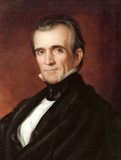 |
James Knox Polk |
1845-1849 |
A |
A former Speaker of the House of Representatives, Polk was a member of the Democratic party and an associate of Andrew Jackson. He re-established an independent Treasury system, presided over the annexation of Texas, Iowa and Wisconsin as states, and negotiated an arrangement with Britain over the disputed Oregon country. The U.S. victory over Mexico in the Mexican-American War resulted in the incorporation of the former southwestern territories of New Spain. Polk's policy of territorial expansion gave the United States substantially its present contiguous borders, stretching from the Atlantic to the Pacific Oceans. When John Sutter, a Swiss immigrant, needed lumber in early 1848, he assigned the task to one of his employees, James Marshall. Marshall built a sawmill on the South Fork of the American river, about 40 miles from Sutter's California home. On January 24, 1848, while at the sawmill, Marshall discovered a gold nugget. He and his men easily found more gold nearby. Sutter and Marshall tried to keep the discovery secret, but word of the find soon leaked out, and people began to move to California looking for gold. Polk informed Congress of the finding in December of 1848. |
| 12 |
 |
Zachary Taylor |
1849-1850 |
I |
A former Major General in the U.S. Army, Taylor was the Whig party candidate in the 1848 presidential election. He won the general election, defeating Lewis Cass of the Democrat party and Martin Van Buren of the Free Soil party. Taylor sought to moderate tensions between advocates of maintaining the slave status of newly-acquired western lands and abolitionists. The Clayton-Bulwer Treaty between the United States and the United Kingdom resolved issues concerning the countries of Nicaragua and Honduras and a proposed canal in Central America linking the Atlantic and Pacific Oceans. In 1848, the California Gold Rush had triggered exceedingly large migrations from North and South America, Europe, China, and Australia to California, and a massive expansion of railroads, infrastructure and investments in western lands. Taylor died suddenly in July 1850 at age 65 of a digestive ailment, possibly cholera morbus or acute gastroenteritis. |
| 13 |
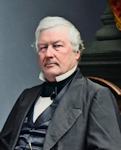 |
Millard Fillmore |
1850-1853 |
B |
Born to a poor family, Fillmore taught himself to read and write. He passed the bar exam at age 23 and had a successful career as a lawyer. A Whig, Fillmore became President upon the death of Zachary Taylor. He appointed Daniel Webster his Secretary of State. His term of office was characterized by his support of a compromise in disputes over the institution of slavery, which was integral to the economy of southern states, but was increasingly opposed by northern states. He was instrumental in the admission of California as a free state, granting territorial status to New Mexico, adoption of the Fugitive Slave Act, and terminating the slave trade in the District of Columbia. Fillmore authorized a naval expedition by Commodore Mathew Perry that furthered United States influence abroad and established trade relationships with Japan and other countries. |
| 14 |
 |
Franklin Pierce |
1853-1857 |
B |
A northern Democrat, Pierce considered the abolitionist movement a threat to the integrity of the nation. He supported the Kansas-Nebraska Act of 1854, which created the territories of Kansas and Nebraska and repealed the Missouri Compromise that had effectively divided the country along the 36.5 deg parallel. The act let citizens of each territory, rather than Congress, determine whether to allow slavery. It did not affect the overall slave population, since the importation of slaves had ceased in 1808. Pierce completed the Gadsden Purchase, adding lands acquired from Mexico for $10 million to southern Arizona and New Mexico, and signed trade treaties with Britain and Japan. By 1855, California gold production began to decline, economic growth was reduced, and banks became more cautious with their lending. |
| 15 |
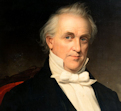 |
James Buchanan |
1857-1861 |
B |
Buchanan, a member of the Democrat party, advocated a limited role for the federal government and supported states' rights. In March 1857, right after Buchanan's inauguration, the U.S. Supreme Court issued the Dred Scott v. Sandford decision, which determined that Congress had no constitutional power to exclude slavery in the western territories. Buchanan's support of the court's decision was unpopular among abolitionists in northern states, but was welcomed in southern states. The worldwide panic of 1857 was partly caused by economic adjustments to reduced economic prospects. In the United States, on August 11, 1857, N. H. Wolfe and Co., a large flour and grain company in New York City, failed, shaking investor confidence and beginning a selloff in the stock market and a broad economic downturn that lasted throughout Buchanan's term in office. The states of Minnesota, Oregon and Kansas were admitted to the United States during Buchanan's Presidency. |
| 16 |
 |
Abraham Lincoln |
1861-1865 |
B |
Lincoln was born to a Kentucky frontier family of limited means and, like Fillmore, was mostly self-taught. He was 6 ft, 4 in tall. Lincoln obtained his license to practice law in 1836 and worked as a lawyer in Illinois. His great speaking talent aided his career. Before entering national politics in 1856 he served in the Illinois state legislature. A Whig and later a Republican, Lincoln in 1858 campaigned against Stephen A. Douglas for Senator. He lost the election, but in debating Douglas he gained national recognition and won the Republican nomination for President in 1860. The clash of northern abolitionist sentiment and federal government control with states' rights advocates and southern slavery-enabled agricultural economy came to a head in 1860, shattering political parties and splitting the country along the 36.5 deg parallel. Election results favored Lincoln and the Republicans, who garnered 180 out of 303 electoral votes, but only 39.8 percent of the popular vote. Three other parties split 60.2 percent of the vote. Southerners perceived the election of Lincoln as an existential threat, that with northern states dominance of the federal government, slavery would be abolished, overriding constitutional protections of states' rights. There were attempts to adopt a compromise that allowed western territories to choose their domestic institutions (slave-holding status), but they failed. On December 20, 1860, the state of South Carolina seceded from the Union. By February 1, 1861, six additional states had seceded; they began to organize the Confederate States of America. The Union officer in command of Fort Sumter in South Carolina, Major Robert Anderson, refused to obey orders to evacuate, and on April 12, 1861, the state militia attacked the fort and took it by force. No one was killed, but the Union and the Confederacy immediately prepared for war. The War Between the States went on until April 1865. Officially, 664,035 soldiers died in the war (364,511 Union and 299,524 Confederate), but estimates that include civilians are as high as 850,000 dead. Although he spoke against slavery from the start of his political career, Lincoln did not act officially to end the practice until 1863, when he issued the Emancipation Proclamation. Anti-war Democrats and irreconcilable pro-Confederate elements despised Lincoln, but pro-War Democrats and Radical Republicans supported him, and he appealed to those who simply wanted to preserve the Union. Lincoln won re-election in 1864, as Union military forces burned a path of destruction through the southern heartland. On April 1865, Lincoln was shot and killed by John Wilkes Booth while attending a play at Ford's Theatre in Washington, as part of a plot against Union leaders by Confederate sympathizers. Lincoln's term of office was devoted to the war effort, neglecting civil matters in favor of military ones; its singular occomplishment was preserving the Union, and it left the country in a shambles. The states of West Virginia and Nevada were added to the Union during Lincoln's Presidency. |
| CSA |
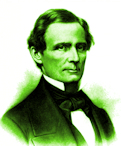 |
Jefferson Davis |
1861-1865 |
B |
During the War Between the States, 1861 to 1865, America was divided into two countries, the Union and the Confederacy. Jefferson Davis was President of the Confederate States of America for the duration of the conflict. Davis was born to a Kentucky farmer family and grew up in Mississippi and Louisiana. He graduated from the United States Military Academy and served in the U.S. Army, rising to the rank of Colonel. A Democrat, Davis served in the U.S. House of Representatives and as a Senator from Mississippi. Davis believed each state was sovereign and had the right to secede from the Union. However, after Lincoln's election he counseled southerners to delay any action, because he did not think the northern states would agree to allow the exercise of the right to secede. Davis resigned from the U.S. Senate on January 21, 1861, after Mississippi seceded from the Union. On February 9, a constitutional convention of seceding states met at Montgomery, Alabama, and unanimously elected Davis President. Several forts in Confederate territory remained in Union hands, and Davis sent a commission to Washington with an offer to pay for any federal property on Confederate soil, as well as the southern portion of the national debt, but Lincoln refused to meet with commission members. Davis and his cabinet decided to demand that the federal garrison at Fort Sumter surrender and, if this was refused, to use military force. On April 12, after the Union officer in command refused to surrender, Confederate General P. G. T. Beauregard began the bombardment of Fort Sumter. The artillery attack continued until the fort's surrender on April 14. Lincoln called up 75,000 troops to recapture federal property, and in the North and South huge rallies were held demanding war. Davis presided over up to sixteen states that belonged to the Confederacy at one time or another. Border states, Missouri and Delaware, that were ambiguously aligned, also were affected by the conflict. In the war, the Union had a significant advantage in that its population, about 21 million, greatly exceeded the Confederacy's 9 million, of which 4 million were slaves. But the Confederates had better military leadership, and they were fighting for their way of life and mostly closer home. The widespread slave uprisings that abolitionists expected did not materialize, and in actuality slaves often fought in detachments led by their masters. Rebel regiments were mostly manned by volunteers, while the Union often used conscripts. The greatest advantage of the Union was its comparatively large industrial base, while the South's strength, its agriculture, suffered from the absence of those joining the combatants. Like Lincoln's, Davis' term of office was mostly devoted to the war effort and often overlooked civilian concerns. Some critics affirm that rather than mostly adopting a defensive military posture, Davis' best chance of winning the war was to attack swiftly and decisively, seize Washington, D.C., and force a Union capitulation. Davis was captured on May 10, 1865, by Union forces after the earlier surrender of General Lee's Army of Northern Virginia, but while fighting was still going on. He was charged with treason, but was never tried, and was imprisoned for two years in Fort Monroe. He retired to Mississippi and wrote The Rise and Fall of the Confederate Government. |
| 17 |
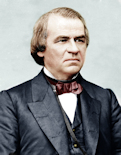 |
Andrew Johnson |
1865-1869 |
B |
Johnson, a Democrat, assumed the Presidency after the death of Lincoln. With a poor chidhood, Johnson was self-educated and apprenticed as a tailor. He became mayor of Greeneville, Tennessee, in 1834, and was elected to the U.S. House of Representatives in 1843. Johnson ran for Tennessee Governor against Whig Gustavus Henry in the 1853 election and won. He was particularly popular among small farmers and tradesmen who considered him a man of the common folk. After the War Between the States started, Johnson was the only Democrat Senator that did not resign. Lincoln used his power as Commander-in-Chief to appoint military governors over Union-controlled southern regions, and when fairly early during the war parts of Tennessee came under Union control he appointed Johnson Military Governor of Tennessee. When Lincoln ran for a second term he chose Johnson, a Democrat, as his running mate to broaden his support. The Lincoln-Johnson National Union ticket prevailed in the 1864 election. As President, Johnson was unpopular with the Republican-dominated Congress, which led to his impeachment by the House of Representatives in 1868 over his policies regarding post-war governance of former Confederate states. He was later acquitted by the Senate. In 1867, Johnson approved a treaty with Russia that transferred the territory of Alaska to the United States for $7.2 million. He also claimed Wake Island in the Pacific Ocean for the United States. The state of Nebraska was added to the United States during Johnson's term in office. After his presidency, Johnson returned to Tennessee and was elected to the Senate in 1875; the only former U.S. President to serve in the Senate. |
| 18 |
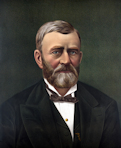 |
Ulysses S. Grant |
1869-1877 |
C |
Grant grew up in Ohio, where his father owned a tannery. He graduated from the United States Military Academy in 1843 and served in the Army, where he rose to the rank of Captain. Grant resigned from the Army in 1854. His business ventures in farming and real estate failed, and he joined his father's leather business. In 1861, when the War Between the States broke out, Grant rejoined the Army as a Colonel and was soon appointed as Brigadier General. During the war Grant gained a reputation for aggressive and effective leadership, and in March 1864 was promoted to Lieutenant General and was given command of all the Union armies. In 1866, after the end of the war, Grant was appointed to the rank of General of the Armies. He gained the Republican nomination for the 1868 Presidential election. Grant won the election and was inaugurated as President on March 4, 1869. His focus was on Reconstruction, controlling a restless and bitter white southern population and on implementing provisions of the Enforcement Acts that protected the voting rights of newly-freed black slaves. Northern states were able to overcome the disruption of the war fairly rapidly. Southern blacks were encouraged to vote in new elections and to run for public office. The former Confederate states for a time remained under military rule, and after most occupiers were withdrawn Grant at times sent Army troops to enforce federal regulations. Many plantations failed or were broken up, since much of the land had been ravaged, the crops destroyed, and the livestock slaughtered or stolen. Confederate armed forces were disbanded, and the rights of former Confederate government officials and military officers to vote and to hold public office were suspended. The discontent and turmoil that plagued the southern states led to the emergence of organizations such as the Ku Klux Klan, that opposed the new federal government practices. Adding to the chaotic state of the southern economy, opportunistic northerners, called carpetbaggers, came to southern states and took advantage of the local populace for their own financial and political gain. Grant's Peace Policy moved Indian tribes closer to white populations, housing them on reservations and assisting them in becoming farmers, but this approach did not work well. During the Sioux War of 1876 a battle in southeastern Montana Territory at the Little Bighorn River, between combined forces of Sioux, Cheyenne, and Arapaho tribes and the 7th Cavalry Regiment of the U.S. Army resulted in the defeat of U.S. forces. Colorado was admitted to the United States during Grant's term in office. |
| 19 |
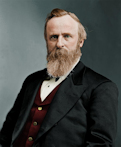 |
Rutherford Birchard Hayes |
1877-1881 |
B |
A lawyer from Delaware, and earlier a Whig, Hayes joined the Republican party in 1854. He served as a Brigadier General in the Union Army. After the war, Hayes served in the U.S. House of Representatives 1865-1867, and was Governor of Ohio 1868-1872 and 1876-1877. Hayes assumed the presidency in 1877, following the troubled 1876 presidential election. Neither Hayes, a Republican, or Democrat Samuel J. Tilden initially won enough electoral votes, and Tilden actually won the popular vote. Hayes generally had majorities in northern and western states, Tilden in southern states. Constitutionally, if no candidate wins the electoral vote, the House of Representatives selects the new President. Rather than replaying the War Between the States, a Congressional Commission gave Hayes 20 contested electoral votes and, in the Compromise of 1877, a deal was negotiated whereby southern Democrats accepted Hayes's presidency in return for the end of Reconstruction and of the federal military occupation of former Confederate states. As President, Hayes was a proponent of meritocracy and supported reliance on the gold standard. He worked to limit the practice of giving federal jobs to political supporters. The Great Railroad Strike of 1877 began in Martinsburg, West Virginia, after the Baltimore and Ohio Railroad cut workers' wages. Due to widespread economic problems, workers in several other cities also went on strike and destroyed railroad facilities. Hayes put down the riots by ordering the Army to intervene against the railroad workers. Working with the Mexican government, Hayes curtailed southern border raids by bandits into Texas. |
| 20 |
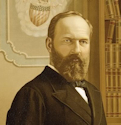 |
James A. Garfield |
1881 |
I |
Born in an Ohio log cabin, Garfield graduated from Williams College in Massachusetts. He became professor of ancient languages at Western Reserve Eclectic Institute and in 1857, at age 25, became the institute's president. Garfield was elected in 1859 to the Ohio legislature. During the War Between the States he served as a Colonel and was elected to the U.S. House of Representatives. Waiting for Congress to begin its session, he served as Chief of Staff in the Army of the Cumberland, winning promotion to Major General after distinguishing himself at the 1863 Battle of Chickamauga. Garfield served in the U.S. House of Representatives until he was nominated as a Republican in the 1880 presidential election. He defeated his Democrat opponent, Winfield Scott Hancock, and was inaugurated President on March 4, 1881. On July 2 of that year, after only four months in office, Garfield was attacked in the railroad station in Washington, D.C., by Charles Guiteau, a disappointed office seeker. Guiteau's first shot only grazed Garfield's arm, but the second bullet pierced his back and lodged behind his pancreas. Complications from the wound led to sepsis, and Garfield died on September 19, 1881. |
| 21 |
 |
Chester A. Arthur |
1881-1885 |
C |
Arthur became President upon the death of President Garfield in September 1881, two months after Garfield was shot by an assassin. He was born in Vermont, grew up in New York state, and practiced law in New York City. As President, Arthur, a Republican, advocated and enforced the Pendleton Civil Service Reform Act and strengthened the Navy. He failed to reduce the federal budget surplus that had been accumulating since 1865. The Immigration Act of 1882 levied a 50 cent tax on immigrants to the United States, and excluded from entry individuals judged to be mentally ill, the intellectually disabled, criminals, and others potentially dependent upon public assistance. Arthur signed the Chinese Exclusion Act, which banned Chinese immigration to the United States for ten years. In 1882, he signed the Edmunds Act into law, which made polygamy a federal crime, barred polygamists from public office, and stripped them of their voting rights. |
| 22 |
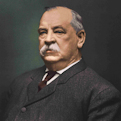 |
Grover Cleveland |
1885-1889 |
B |
Stephen Grover Cleveland was born in 1837 in New Jersey and grew up in New York. Facing compulsory conscription in 1863, Cleveland paid a substitute to serve in his place in the Union Army. A lawyer, he was elected mayor of Buffalo in 1882, and was Governor of New York state 1883-1885. Cleveland was the Democrat candidate for President in the 1884 general election, which he won. He was 47 years old when he was inaugurated President March 4, 1885. In June 1886 he married 21-year-old Frances Folsom at the White House. Cleveland developed a reputation for honesty and fairness, and tended to appoint government officials based on merit rather than solely political affiliation. He signed the Interstate Commerce Act, a federal law regulating the railroads, and worked to expand and modernize the armed forces. Cleveland signed the Scott Act, which prevented the return of Chinese immigrants who left the United States. He enforced treaties between the federal government and American Indian tribes, preventing white settlers from moving into Winnebago and Crow Creek Indian lands in the Dakota territory. Cleveland campaigned for but lost the 1888 election. |
| 23 |
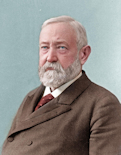 |
Benjamin Harrison |
1889-1893 |
C |
Harrison was born in 1833 in Ohio. He was a grandson of William Henry Harrison. A bright student, Harrison graduated from Miami University in Oxford, Ohio, in 1852. Harrison, a Republican, was elected President in 1888, winning a majority of electoral college votes despite losing the popular vote. The western states of North Dakota, South Dakota, Montana, Idaho, Wyoming, and Washington, were admitted to the United States during his administration. Harrison favored an amendment to the Land Revision Act of 1891, which created the national forest reserves. He imposed the protectionist McKinley Tariff, and the Sherman Antitrust Act, and worked to modernize and strengthen the Navy. Harrison's high tariffs were unpopular as was his high level of federal spending. On January 16, 1893, a coup d'etat led by a Committee of Safety including several Americans overthrew the Hawaiian Kingdom and convinced American diplomat John L. Stevens to call in the U.S. Marines to protect the interests of the United States. The insurgents established a Provisional Government of Hawaii under President Sanford B. Dole. Harrison lost the 1892 election to Democrat Grover Cleveland. |
| 24 |
 |
Grover Cleveland |
1893-1897 |
C |
After his first term as President, during the Harrison presidency, Cleveland practiced law in New York City. He used the unpopularity of Harrison's high McKinley Tariff and federal spending spree to propel his run for offfice in the 1892 election. Cleveland started his second term as President on March 4, 1893. He brought a pro-business, limited-government philosophy to his term in office. Harrison's high tariffs had overly protected industry from foreign competition and led to overproduction and recession. Cleveland sought to restore economic prosperity by getting Congress to repeal the Sherman Silver Purchase Act of 1890, but the depression actually got worse. His economic policies placed the dollar on a gold standard, which strengthened the currency but reduced the amount of gold in the U.S. treasury. Cleveland opposed the annexation of Hawaii, but the Republic of Hawaii was nonetheless declared by members and associates of the Provisional Government, and Sanford Dole became its President on July 4, 1894. Cleveland reached an agreement with a group of bankers led by wealthy financier John Pierpont Morgan to market U.S. government bonds abroad for gold. The sale of the bonds successfully built up the government's gold supply, but it gave the impression of an improper collusion between Cleveland and Morgan. The impression that Cleveland did not care for the common man was heightened by his reaction to the Pullman railroad car strike of 1894. Cleveland sent federal troops to Chicago to put down riots at the Pullman facility. His decisive action worked to quickly stop the violent strike and was popular with the business community, but it lost him the support of influential railroad unions. Cleveland invoked the Monroe Doctrine to make Great Britain accept arbitration in resolving a boundary dispute between British Guiana and Venezuela. In 1896, Utah was admitted to the United States as the 45th state. |
| 25 |
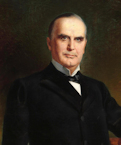 |
William McKinley |
1897-1901 |
A |
McKinley was born in Ohio in 1843. He enlisted in the Union Army at age 18 and served with distinction in the War Between the States, rising to the rank of brevet Major. After the war he studied law, was admitted to the bar in 1867, and opened a law office in Canton, Ohio. A Republican, McKinley served six terms in the U.S. House of Representatives, and was Governor of Ohio 1892-1896. He ran for office in the 1896 Presidential election and defeated his Democrat opponent, William Jennings Bryan. McKinley was inaugurated President March 4, 1897, immediately facing an economic depression. He advocated the gold standard for U.S. currency, and favored the 1897 Dingley Tariff to protect American industry from foreign competition. McKinley openly sympathized with Cuban revolutionaries fighting for independence from Spain. In 1898, when the U.S. battleship Maine was blown up while at anchor in Havana harbor, McKinley signed Congress's declaration of war against Spain. The Spanish-American War (April 21 to December 10, 1898) was fought in the Caribbean and the Pacific theaters and involved pitched battles on land and at sea. The United States emerged victorious, and in the peace settlement obtained Spain's colonies of Puerto Rico, the Philippines and Guam. Cuba came under control of the United States, but had a standing revolutionary army and was promised independence. The United States annexed the independent Republic of Hawaii in 1898 and it became a United States territory. In 1900, a Chinese secret organization, the Society of the Righteous and Harmonious Fists, led an uprising in northern China against western and Japanese influence. The rebels, called Boxers because of physical exercises they performed thinking they would make them bullet-proof, besieged the foreign legation district of China's capital, Peking, and threatened American missionaries with death. In cooperation with other western powers and without waiting for a Congressional declaration, McKinley ordered 5,000 troops to Peking in the China Relief Expedition. An international force including American troops rescued the westerners and subdued the Boxers in 1901. McKinley's second term ended abruptly; on September 6, 1901, while standing in a receiving line at the Buffalo Pan-American Exposition a deranged anarchist shot him and he died eight days later. |
| 26 |
 |
Theodore Roosevelt |
1901-1909 |
A |
Roosevelt became President upon the death of President McKinley, after McKinley was shot by an assassin. He was born in New York in 1858, and was homeschooled. An avid sportsman and naturalist, he graduated magna cum laude in 1880 from Harvard University Columbia Law School. Roosevelt was appointed Assistant Secretary of the Navy (1897-1898) by President McKinley. He served in the U.S. Army 1882-1898 and commanded the 1st Volunteer Cavalry, rising to the rank of Colonel. Roosevelt fought with great distinction in the Spanish-American War battle of San Juan Hill, where on July 1898, American volunteers and regular Army soldiers mounted a frontal attack and overwhelmed a position defended by a superiorly-armed entrenched Spanish force. Back in the United States, Roosevelt served as Governor of New York state (1899-1901) before becoming William McKinley's Vice President in 1901. A Republican, as President Roosevelt adopted the slogan of a square deal for every man. He used the Sherman Antitrust Act aggressively, breaking up or restricting large securities, railroads and oil companies. Roosevelt worked with Congress to create the Department of Commerce and Labor, which included a Bureau of Corporations, and helped to peacefully settle the coal miner strike of 1902. He ran for and won a four-year term as president by a landslide in 1904. Roosevelt led Congress to pass the Meat Inspection Act of 1906 and the Pure Food and Drug Act, controlling what had been a mostly unregulated industry. He advocated the conservation of natural resources and federal protection of land and wildlife, enacted several conservation programs, and created five National Parks and eighteen National Monuments. During Roosevelt's term in office, the United States became a world power, and he helped to arbitrate differences between Japan and Russia. He was awarded the Nobel Peace Prize in 1906. Roosevelt supported the construction of a canal in Central America, linking the Pacific and Atlantic Oceans. He favored Panama, then a part of Colombia, as the location of the canal. When Colombian authorities objected, Panamanian residents rebelled, and with United States support succeeded in creating the nation of Panama, which became the site of the canal. Roosevelt honored his 1904 pledge not to run for a third term. |
| 27 |
 |
William H. Taft |
1909-1913 |
B |
Taft was born in 1857 in Cincinnati, Ohio. His father was War Secretary and Attorney General under President Grant. Taft graduated from Yale College in 1878 and attended Cincinnati Law School, obtaining a Bachelor of Laws degree in 1880. He worked as a newspaperman, as Hamilton County assistant prosecutor, and as Collector of Internal Revenue, before beginning to serve as a judge in 1887 in the Superior Court of Cincinnati. Taft was U.S. Solicitor General, 1890-1892, before being appointed federal judge for the Sixth Circuit Court of Appeal, and was Governor-General of the Philippines (1901-1903). He was Secretary of War (1904-1908) and Provisional Governor of Cuba (1906). Taft, a Republican, was inaugurated President of the United States on March 4, 1909. He continued Roosevelt's endeavor to break up or restrict businesses acting as monopolies or near monopolies, and his administration brought antitrust suits against Standard Oil, American Tobacco, and U.S. Steel. Taft deviated from Roosevelt's policies regarding land conservation, in that he thought such matters should be handled through Congress-enacted legislation rather than executive action. The states of New Mexico and Arizona were admitted to the Union in 1912. Taft carried out a policy of basing federal appointments on merit rather than political considerations, but held that appointments of blacks to positions which local whites would oppose should be avoided to prevent racial unrest, and concentrated his appointments of blacks to northern states. Although Taft opposed a federal income tax, during his term Congress enacted the 16th Amendment, that gave Congress the power to lay and collect taxes on income. Taft reorganized the State Department into geographical divisions consistent with U.S. national interests. The U.S. would not interfere in European affairs, but would use force if necessary to enforce the Monroe Doctrine in the Americas, particularly regarding the Panama Canal then under construction. During his term in office, Taft's policies evolved from those of his predecessor, Roosevelt, whose views also changed, causing a rift within the Republican party. Taft won the Republican nomination for the 1912 Presidential election, but Roosevelt started a new party, the Progressive Party, splitting the vote and leading to Democrat Woodrow Wilson winning the election. |
| 28 |
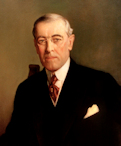 |
Woodrow Wilson |
1913-1921 |
C |
Wilson was born in 1856 in Virginia, the son of a Presbyterian minister, and grew up in Georgia, South Carolina and North Carolina. He overcame dyslexia and became interested in literature. Wilson graduated from Princeton University (B.A.) in 1879, studied law at the University of Virginia, and briefly practiced law in Atlanta. He obtained a Ph.D. from Johns Hopkins University in 1886 and taught at Bryn Mawr College and Wesleyan University before moving to Princeton, where he taught Political Science 1890-1902. A Democrat, Wilson was elected Governor of New Jersey in 1910. He ran for President in the general election of 1912 and won the election. Wilson was inaugurated as U.S. President on March 4, 1913. He signed the Revenue Act of 1913, which lowered tariffs and updated the federal income tax, and supported the Federal Reserve Act, which created the Federal Reserve System. The Federal Trade Commission Act and the Clayton Antitrust Act promoted business competition and restrained the power of large corporations. The United States remained uninvolved in European affairs when widespread war broke out in 1914, and Wilson won re-election in the 1916 Presidential election. However, Wilson asked Congress for a declaration of war against Germany in 1917, in response to German submarine attacks that sank American merchant ships. When the United States entered the World War, Wilson oversaw wartime mobilization and worked on diplomacy and postwar plans. Although widely seen as a peacemaker abroad (he was instrumental in the creation of the League of Nations and was awarded the Nobel Peace Prize in 1919), Wilson's participation in the World War was not popular at home, and despite the Allied victory in Europe, Republicans won control of Congress in 1918. Wilson signed the 1919 Treaty of Versailles, which ended the war and imposed severe penalties on Germany. The other powers aligned with Germany (Austria-Hungary and the Ottoman Empire) signed similar treaties, which imposed reparations broadly considered excessive and counter-productive. The 18th Amendment banned the production, importation, transportation, and sale of alcoholic beverages nationwide. On October 2, 1919, Wilson suffered a stroke that left him partially paralyzed on his left side and diminished his performance in office for the rest of his term. Wilson did not seek a third term in the 1920 election, and Republican Warren G. Harding won the Presidency in a landslide. |
| 29 |
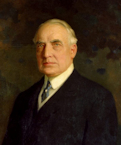 |
Warren G. Harding |
1921-1923 |
C |
Harding was born in 1865 in Ohio. In 1870, Harding's family moved to Caledonia, and as a youth he worked at his father's newspaper. Harding graduated from Ohio Central College in 1882 and worked as a teacher, in insurance, and in newspapers in Marion, Ohio. He became interested in politics and was a delegate to the Republican state convention in 1888. He served in the Ohio state Senate 1900-1904, was Lieutenant Governor of Ohio 1904-1906, and U.S. Senator from Ohio 1915-1921. Harding won a closely contested Republican nomination to the 1920 Presidential election and went on to win the election in a landslide. He was inaugurated U.S. President on March 4, 1921. To address a postwar economic recession, Harding proposed a reduction of income taxes and an increase in tariffs on agricultural imports to protect American farmers. Congress enacted an emergency tariff increase on agricultural products, passed an act authorizing a Bureau of the Budget, and the Revenue Act of 1921 reduced marginal income tax rates and introduced preferential treatment for capital gains. Harding signed the Federal Highway Act of 1921, which improved and expanded the country's highways. He was opposed to the United States joining the League of Nations, and the Treaty of Versailles was never ratified by the Senate. Separate treaties with Germany, Austria and Hungary were ratified in 1921, and American troops stationed in Cuba were withdrawn that year. Economic adjustments in the postwar economy led to unemployment and wage issues, and in 1922 Harding had to mediate strikes in the railroad and mining industries. Harding favored regulation of radio broadcasting, and Commerce Secretary Hoover convened a conference of radio broadcasters, leading to an agreement for licensing radio frequencies through the Commerce Department. In June, 1923, Harding set out on a tour of western states and Canada. He fell ill while in Seattle, Washington, and was taken by train to San Francisco, where doctors determined he had heart problems and pneumonia. He died August 2, 1923. |
| 30 |
 |
Calvin Coolidge |
1923-1929 |
B |
A lawyer from New England, Coolidge was born in Plymouth Notch, Vermont, in 1872. Coolidge graduated cum laude from Armherst College, and was admitted to the Massachusetts bar in 1897. In 1898, he was elected to the City Council of Northampton and later became City Solicitor. Coolidge, a Republican, climbed the ladder of Massachusetts state politics, serving in the state House of Representatives, as Mayor of Northampton, in the Massachusetts Senate, and as Lieutenant Governor. He was Governor of Massachusetts 1919-1921, and was elected Vice President of the United States in the general election of 1920. A day after President Harding died unexpectedly, Coolidge was sworn in as U.S. President on August 3, 1923. Upon taking office, Coolidge oversaw the resolution of the Teapot Dome scandal and other irregularities left over from Harding's administration. His initial address to Congress was the first presidential speech broadcast over the radio. He signed the Washington Naval Treaty, in which the major Allies of the World War agreed to limit naval construction to prevent an arms race. He also signed an act granting citizenship to all American Indians born in the United States, and the Revenue Act of 1924, which reduced the top marginal tax rate and personal income tax rates, and increased the estate tax. Coolidge won a full term as President in the 1924 general election, where former Confederate states voted for Democrat John Davis, and Coolidge won all other states except Wisconsin. Coolidge followed a laissez-faire policy towards business administration, with reduced tax rates and a limited role of the federal government during a period of economic growth. The Great Mississippi Flood of 1927 caused unprecedented inundations, and in 1928 Congress enacted a law that gave the federal government a role in flood mitigation. Coolidge withheld recognition of the Soviet Union, a Communist state, and supported the normalization of relations with Mexico and that country's recovery following its 1910-1920 civil strife. He continued an American military presence in Nicaragua to stabilize its government. Coolidge chose not to seek reelection in 1928. |
| 31 |
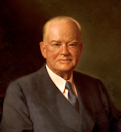 |
Herbert Hoover |
1929-1933 |
D |
Herbert Hoover was born in West Branch, Iowa, in 1874. His father was a store owner and blacksmith. Hoover lost both his parents at an early age and was raised in Oregon by an uncle. He graduated from Stanford University in 1895 with a degree in engineering. He worked as a mine engineer and manager in Australia and China, and became operating partner of the Bewick, Moreing Company in 1901. Hoover left Bewick, Moreing in 1908 and was very successful working as a mining consultant and financier based mostly in London, England. In 1917, President Wilson appointed him to lead the U.S. Food Administration. Hoover joined the Republican Party in 1920 and was Secretary of Commerce 1921-1928. When Coolidge decided not to seek reelection, Hoover won the Republican nomination and was elected U.S. President. He was inaugurated as President on March 4, 1929, at a time of great prosperity. But increased speculation had accompanied the continued economic expansion, and by September 1929, with share valuations at irrationally high levels, the stock market showed signs of instability. On October 24, 1929, stock market prices dropped by 11 percent, and by October 29 panic selling drove the decline to a total of 25 percent. In an effort to counter the ensuing economic depression, Hoover adopted a policy of increased taxation. The Revenue Act of 1932 raised income taxes for top earners from 25 percent to 63 percent, doubled the estate tax, raised corporate taxes by 15 percent, and instituted a 2-cent tax on bank checks. Although the 18th Amendment's prohibition of alcoholic beverages was increasingly unpopular and led to widespread crime and corruption, Hoover signed the Increased Penalties Act, which made minor alcohol violations felonies. In June 1932, facing economic hardships, thousands of World War veterans demonstrated in Washington, D.C., demanding early payment of bonuses promised by the 1924 World War Adjusted Compensation Act. Police failed to disperse the crowd, and Hoover ordered the Army to clear the protest. Hoover ended the occupation of Nicaragua and favored a non-intervention policy in foreign affairs. He was critical of Japan's invasion of China's Manchuria, but took no military or economic action. Hoover's high-taxation policy was counterproductive, and during his term in office the gross national product dropped by 30 percent. |
| 32 |
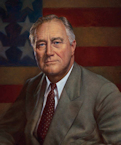 |
Franklin D. Roosevelt |
1933-1945 |
B |
Roosevelt was born in 1882 in Hyde Park, New York. He was a distant cousin of Theodore Roosevelt. Roosevelt graduated from Harvard College, attended Columbia Law School, and practiced law in New York City. He was elected to the New York state Senate in 1911, and was Assistant Secretary of the Navy 1913-1920. In 1921, at age 39, Roosevelt contracted poliomyelitis and was unable to walk again, but although wheelchair-bound continued an active life. A Democrat, Roosevelt served as Governor of New York 1929-1933. He was elected U.S. President in the 1932 general election. As President, Roosevelt favored a greatly expanded role of the federal government and proposed sweeping economic stimulus programs for business and agriculture, and social support for the unemployed. He established the Tennessee Valley Authority. The 21st Amendment was ratified in 1933, terminating the 18th Amendment's federal prohibition of alcoholic beverages. Roosevelt took the United States off the gold standard, and the increased federal government spending of his New Deal led to budget deficits. By 1935 the downward spiral of economic depression had begun to recede, but leaders of corporations and banks resented Roosevelt's socialist programs. Roosevelt went on to adopt the Social Security program, impose heavier taxes on top earners, and increase regulations on public utilities and banks. He won re-election of 1936 in a landslide. Stymied by resistance from the Supreme Court to the more radical features of his New Deal program, Roosevelt sought to enlarge the Court and pack it with sympathetic appointees, but the scheme, which arguably violated constitutional provisions for the separation of powers, was opposed by Republicans and some Democrats, and ultimately failed. The Fair Labor Standards Act of 1938 established a federal minimum wage, required overtime pay under certain circumstances, and outlawed child labor. The unemployment rate dropped from 20.6 percent in 1933 to 9.5 percent in 1940. Roosevelt formalized relations with the Soviet Union's Communist regime, withdrew U.S. forces from Haiti, and ended U.S. intervention rights in Panama and Cuba. Worldwide events during Roosevelt's second term involved military actions which the U.S. Congress refused to let the country be involved in (Italian-Ethiopian War, Japan-China War, Spanish Civil War, German annexation of Austria). In 1937, Germany, Italy and Japan agreed on the Anti-Comintern Pact, and were later joined by Hungary, Spain and other nations. On August 23, 1939, Germany and Soviet Russia signed a mutual non-aggression pact. The Second World War began in Europe in September 1939 when Germany invaded Poland and the United Kingdom and France declared war on Germany. On April 1940, Conscription was instituted in the U.S., establishing a peacetime military draft. A year later, Roosevelt issued a secret executive order authorizing a covert operation, the American Volunteer Group (AVG), to aid the Nationalist Chinese government then at war with Japan. The AVG consisted primarily of three P-40B fighter squadrons staffed by pilots and technicians secretly recruited from the U.S. armed forces for service in China and Burma, under the command of Claire Chennault a former Major in the U.S. Army Air Corps, then a civilian advisor to the Chinese government. The AVG became operational November 18, 1941; they fought their first air battle against Japanese Army aircraft on December 20, 1941, just days after Japan's December 7 attack on Pearl Harbor, when Roosevelt directed the mobilization of U.S. national resources for the Second World War. Roosevelt was elected to a third term as President in 1940 and a fourth in 1944. His primary endeavor was the conduct of the war, which he carried out ably despite declining health. Wartime transformed the nation socially and economically. Unemployment rapidly fell to less than 3 percent, and many women joined the industrial workforce for the first time. The Revenue Act of 1942 instituted tax rates as high as 94 percent and a federal withholding tax. On December 2, 1942, a team of scientists under the direction of Enrico Fermi achieved a self-sustaining Uranium nuclear reaction, and Roosevelt approved the Manhattan Project, to secretly develop a nuclear bomb. During his third term, Roosevelt proposed the G.I. Bill, a benefits program for returning soldiers that Congress enacted in 1944. In conducting the war, Roosevelt depended on talented leaders such as George Marshall, James Forrestal, Chester Nimitz, Ernest King, and Dwight Eisenhower. Roosevelt met with Churchill and Stalin in February 1945 at Yalta, in the Crimea, with Axis forces in retreat. He was intent on convincing Stalin to enter the war against Japan, and failed to realize the danger Communist Russia posed to postwar peace in Europe. Returning from Yalta, victory in the war seemed near, but after 12 years in office, Roosevelt appeared haggard (he had high blood pressure, atherosclerosis, and heart disease), and his administration faced charges of corruption and inefficiency. He died April 12, 1945. |
| 33 |
 |
Harry S. Truman |
1945-1953 |
C |
Truman was born in 1884 in Missouri. He graduated from High School in 1901 and for several years worked at his father's farm in Grandview. Truman served in the Missouri National Guard 1905-1911, and in Army Field Artillery during the First World War, rising to the rank of Captain. He was part owner of a clothing store in Kansas City 1919-1922. Beginning in 1922 he held various positions in the Jackson County Court. Truman, a Democrat, was elected to the United States Senate in 1934 and was reelected in 1940. He ran for Vice President in the 1944 general election and was inaugurated as U.S. Vice President on January 20, 1945. When Roosevelt died, on April 12, Truman was sworn in as President. The initial focus of his presidency was on the final stages of the war in Europe. On May 7, Germany surrendered to General Eisenhower at Rheims, France, and Truman pronounced the following day, May 8, V-E Day. He attended a conference at Potsdam, Germany, with Joseph Stalin, the General Secretary of the Communist Party of the Soviet Union, and worked on plans for the war against Japan. Although by mid-1945 Japan had no chance of winning the war, its leadership refused to surrender unconditionally. Preparations for Operation Downfall, the invasion of the Japanese home islands, were initiated by General Douglas MacArthur, Admiral Chester Nimitz, and General George Marshall. Two massive amphibious landings were planned, supported by an armada of close to 500 ships, the first on Kyushu, with 14 army divisions, and the second on Honshu, with 25 army divisions. In addition to American military, British, Canadian and Australian forces would be involved. It was estimated that Operation Downfall would be completed by the Summer of 1946, at a cost of up to 800,000 Allied dead. Japanese military and civilian casualties would be several million. On April 24, Truman had been briefed by Secretary of War Henry Stimson and General Leslie Groves on the secret Manhattan Project, and he decided to use nuclear weapons if necessary to force Japan to capitulate rather than carry out Operation Downfall. Two atomic bombs were dropped on Japan on August 6 and 9, 1945, and Japan surrendered on August 14, V-J Day. The occupation of Japan began August 28, led by the Supreme Commander for the Allied Powers, General Douglas MacArthur. On September 2, Japan formally surrendered to General MacArthur in a ceremony aboard the USS Missouri in Tokyo Bay. During his first year as President Truman saw the founding of the United Nations, and the increasingly hostile consolidation of Soviet Union dominance over Eastern European nations formerly allied with Germany and Italy. In 1945 China became involved in a civil war between the Nationalists under Chiang Kai-shek and the Communists under Mao Tse-tung. Truman decided not to intervene, and in 1949 the Communists took control of mainland China and drove the Nationalists to Formosa (Taiwan). Truman did not heed the warning of UK Prime Minister Winston Churchill's March 1946 speech referring to an ominous Communist Iron Curtain and recommending an anti-Soviet alliance. Truman next focused on a transition from a war to a peacetime economy. Military demobilization and discontinuance of price controls that in some cases dated back to the prewar depression era were not well coordinated and resulted in labor-management conflicts and shortages in housing and consumer goods. In January 1946 there was a massive steel strike, followed by a coal strike in April. Truman seized the railroads in May, in an attempt to prevent a rail strike, but key railroad unions struck anyway and the nation's rail system stopped operating. The rail strike ended after Truman proposed drafting rebellious strikers into the Army. The 1947 Taft-Hartley Act, enacted overriding Truman's veto, equalized responsibilities of labor unions and employers. Following disagreements with the Soviets over Germany, the United States, France, and the UK agreed to combine their occupation zones, eventually forming West Germany. The Soviet zone became East Germany. The National Security Act of 1947 reorganized all military forces, creating the National Military Establishment (later renamed as the Department of Defense), and created the U.S. Air Force and the Central Intelligence Agency (CIA). Truman won a full term as President in the 1948 general election. The Marshall Plan was put in place to invigorate European economies devastated during WW2 and curtail Soviet expansion. On July 26, 1948, Truman signed an executive order prohibiting discrimination against military personnel because of race, color, religion or national origin. In 1949, the United States, Canada, the UK, Norway, Italy, and several other European countries created a military alliance, the North Atlantic Treaty Organization (NATO). On June 25, 1950, the Korean War started when North Korean leader Kim Il-sung invaded South Korea and his forces rapidly pushed the South Korean military to the south. General Douglas MacArthur, with Truman's approval, landed U.S. troops in Korea and stopped the North's advance. Then, on September 15, 1950, MacArthur executed a brilliant amphibious landing at Inchon, behind North Korean forces, and liberated the South Korean capital, Seoul, ten days later. The Korean War saw the first extensive use of jet aircraft, with USAF F-86's battling MiG-15's flown by North Korean, Chinese, and Russian pilots, for air supremacy. The war also saw extensive use of helicopters for medical evacuation. With United Nations support, by late 1950 American forces pushed the North Koreans further north. MacArthur wanted to extend the war into China to destroy depots supplying the North Koreans, but Truman disallowed crossing the border. Both China and Russia entered the war, sending troops and materials into battle. Truman relieved General MacArthur as Supreme Commander in Korea on April 11, 1951, over policy differences. MacArthur felt the war in Korea could only be won by decisive action, with bombing of Chinese targets or use of nuclear weapons if necessary. Truman favored a cautious approach and felt a truce and orderly withdrawal from Korea could be an acceptable solution. There were several attempts at cease fires and negotiations, but the war continued throughout Truman's term in office. In 1952, Truman consolidated national cryptologic and surveillance functions by creating the National Security Agency (NSA). Highly unpopular, Truman decided not to enter the 1952 Presidential election. |
| 34 |
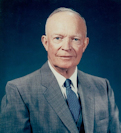 |
Dwight D. Eisenhower |
1953-1961 |
B |
Born in Denison, Texas, in 1890, Eisenhower was brought up in Abilene, Kansas. He attended Abilene High School and graduated in 1909. In 1911 Eisenhower received an appointment to West Point. He participated in various sports, and graduated in the middle of his class in 1915. Eisenhower served in the World War in various capacities, rising to the rank of Brevet Lieutenant Colonel, but saw no combat duty. In his postwar career in the Army, Eisenhower excelled in staff assignments under Generals John Pershing, Douglas MacArthur, and Walter Krueger. When the Second World War broke out, General George Marshall called Eisenhower to Washington, where he worked in the Army General Staff. Eisenhower was promoted to Lieutenant General on July 7, 1942, and commanded Operation Torch, the Allied forces that landed in North Africa in November 1942. He was the Supreme Allied Commander of the Allied Expeditionary Force, charged with planning and carrying out Operation Overlord, the Allied assault on German-held Normandy in June 1944. Following the German unconditional surrender in 1945, Eisenhower was appointed Military Governor of the American occupation zone in Southern Germany. In November 1945, he was named Chief of Staff of the Army. In 1948 Eisenhower became President of Columbia University, in New York City. He ran for President as a Republican in the 1952 general election and won every state, except for West Virginia, Kentucky, and seven southern states. He was inaugurated as President on January 20, 1953. Stalin died in March, 1953, and while Kremlin officials worked out his succession they lost interest in the ongoing Korean War. Eisenhower used the opportunity to revive efforts to obtain an agreement to stop fighting. The Korean People's Army (North Korean military), the People's Volunteer Army (forces of the Republic of China), and the UN Command signed the Korean Armistice Agreement on July 27, 1953. South Korean President Syngman Rhee did not sign the agreement, but for the most part, it effectively ended the Korean War. In September 1955, Eisenhower suffered a heart attack while in Denver, Colorado. He was in hospital for several weeks, and in February 1956 doctors reported he had recovered. The Federal Aid Highway Act of 1956 was enacted on June 1956. It authorized the construction of 41,000 miles of the Interstate Highway System over a 10-year period. In November 1956 Eisenhower was elected for his second term. Following his reelection, Eisenhower worked to maintain economic stability and a balanced budget. During his term in office the economy expanded, inflation was about 2 percent, and unemployment was generally low. The Civil Rights Act of 1957 created the U.S. Commission on Civil Rights and established a civil rights division in the Justice Department. In 1957 Eisenhower sent troops into Little Rock, Arkansas, to assure compliance with racial desegregation orders of a federal court. On February 7, 1958, Eisenhower created the Defense Advanced Research Projects Agency (DARPA), responsible for the development of emerging technologies for use by the military. He signed into law the National Aeronautics and Space Act of 1958, which established the National Aeronautics and Space Administration (NASA), a civilian agency responsible for the space program, and for aeronautics and aerospace research. Hawaii and Alaska became U.S. states in 1959. In a major setback for American interests, on January 1st, 1959, revolutionaries led by Communists Fidel Castro and Che Guevara overthrew the pro-American, anti-Communist Cuban government. The CIA was aware that the revolution, ongoing sporadically since a failed 1953 uprising, had been penetrated by the Soviets and posed a threat to the Cuban and U.S. governments, but Eisenhower had not given the matter sufficient attention, since Castro had not explicitly declared his movement Communist. |
| 35 |
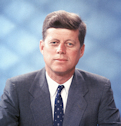 |
John F. Kennedy |
1961-1963 |
C |
Kennedy was born in Massachusetts in 1917, the second of nine children. His father, Joseph P. Kennedy, a businessman and investor, was the first Chairman of the U.S. Maritime Commission, served as the head of the Securities and Exchange Commission, and made a fortune investing in real estate and the film industry, and in bootlegging operations during Prohibition. John F. Kennedy attended Harvard University and graduated cum laude in 1940. He served as a Lieutenant in the U.S. Navy in the Pacific theater during the Second World War. A Democrat, Kennedy served in the U.S. House of Representatives 1947-1953, and as a Senator from Massachusetts 1953-1960. Kennedy, the Democrat Party nominee for President in the 1960 general election, participated in the first televised presidential debates, facing Republican nominee Richard Nixon. Kennedy was narrowly elected President, winning an electoral college majority and 49.7 percent of the popular vote to Nixon's 49.5 percent. He was inaugurated U.S. President on January 20, 1961. Kennedy's domestic policy focused on an expansion of the federal role in government and an end to racial discrimination. He favored increased government involvement and spending on education, medical care, and anti-recession measures. He continued policies that provided support to the governments of South Vietnam and South Korea. In the aftermath of Fidel Castro's 1959 Communist takeover of the Cuban government, Cuban exiles in the U.S. formed the Democratic Revolutionary Front (DRF), with the purpose to overthrow Castro's regime. In 1960, after Castro aligned himself with the Soviet Union, the CIA covertly began to arm and train Brigade 2506, the military arm of the DRF. On April 15, 1961, CIA B-26 bombers, flown from Nicaragua by Brigade 2506 airmen, attacked Cuban airfields near Havana, San Antonio, and Santiago. Two days later, an invasion force of 1,500 Brigade 2506 troops, launched secretly from Nicaragua and supported by U.S. Navy ships, landed at beaches near Giron, in south-central Cuba. The landing, supported by paratroopers and by B-26 aircraft operated by Brigade 2506 and CIA personnel, initially went well. However, a CIA disinformation plan to disguise support aircraft as FAR (Cuban air force) defectors did not go well, and Kennedy, who wanted U.S. participation to remain secret, cancelled planned air strikes and overt support operations by the U.S. Navy. Without air support or supplies from the sea, Brigade 2506 forces grew short of ammunition and retreated in the face of attacks from numerically superior Castro forces. The invasion effectively ended on April 20, with 118 dead and 1,200 taken prisoner from Brigade 2506, 4 CIA operatives dead, and about 2,200 Cuban armed forces and militia dead. The failed invasion was a severe loss for the Kennedy administration and made Castro an even closer ally of the Soviets. On a speech on May 25, 1961, Kennedy announced his intention to initiate a program to land a man on the moon before the end of the decade. Kennedy's expansionary economic policies helped GDP expand by an average of 5.5 percent during his term in office, with inflation at about 1 percent. Kennedy signed Executive Order 10925, which required government contractors to take affirmative action to ensure equal treatment of employees and established the Committee on Equal Employment Opportunity. On October 1962, surveillance by CIA U-2 spy planes revealed the Soviets' construction of ballistic missile sites in Cuba. Many U.S. National Security Council (NSC) members favored an air attack on the Cuban missile sites, but Kennedy decided on a naval embargo preventing Soviet traffic with Cuba until the missiles were removed. On October 28, the Soviets agreed to dismantle their missile sites. In exchange, the U.S. promised never to invade Cuba and agreed to remove American Jupiter missiles from Turkey and Italy. In September 1962, after a black student enrolled at the University of Mississippi but was prevented from entering, Attorney General Robert Kennedy intervened by sending 540 federal officers to the university. The ensuing riots stopped after President Kennedy sent 3,000 troops to the state, and left two dead and 300 injured. On June 11, 1963, Kennedy intervened when Alabama Governor George Wallace stopped two black students from entering the University of Alabama. Wallace stepped aside, avoiding an armed clash after Kennedy federalized the Alabama National Guard. Kennedy's big-government programs were opposed by conservatives who rallied around Republican Senator Barry Goldwater, and his push for racial integration was widely resented by whites in traditionally Democrat southern states. By late 1963, U.S. military forces in South Vietnam numbered 16,000. Kennedy became dissatisfied with the performance of South Vietnamese leader Ngo Dinh Diem in preventing Viet Cong advances and for ideological clashes between the Catholic Diem and Buddhist monks. In an interview in September, Kennedy expressed his opinion that the Diem government had gotten out of touch with the people. A group of South Vietnamese military officers led by General Duong Van Minh joined in a plot to overthrow Diem and were secretly told that the United States would not oppose a regime change. On November 1, the Generals carried out a coup d'etat and executed Diem and his brother. In late 1963, Kennedy went on a trip to raise campaign funds for the 1964 election that took him to San Antonio, Houston, and Fort Worth. He was killed by an assassin in Dallas, Texas, on November 22, 1963. |
| 36 |
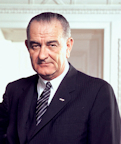 |
Lyndon B. Johnson |
1963-1969 |
C |
Lyndon Johnson was born in 1908 in a farm in Stonewall, Texas. He graduated in 1924 from Johnson City High School, and in 1930 from Southwest Texas State Teachers College with a Bachelor of Science degree in History. A Texas Democrat, Johnson served in the U.S. House of Representatives 1937-1949. While serving in the House, Johnson was appointed a Lieutenant Commander in the U.S. Naval Reserve. He was called to active duty in December 1941 and served in the Pacific theater. Johnson was released from active duty in 1942 and remained in the Navy Reserve until 1949. In 1948, Johnson narrowly won a fraud-tinged Democrat primary election for the U.S. Senate, and later defeated Republican Jack Porter in the general election. Johnson served as U.S. Senator from Texas 1949-1961, and in 1960 ran as U.S. Vice President in the Democrat Kennedy-Johnson ticket for the general election. He was inaugurated as Vice President on January 20, 1961, and became U.S. President on November 22, 1963, after Kennedy's death. Johnson's domestic agenda pivoted on his Great Society initiative; the elimination of poverty and racial injustice through major federal spending programs addressing education, medical care, urban inequality, rural poverty, and transportation. The Clean Air Act of 1963 was enacted to reduce and control air pollution nationwide. The Civil Rights Act of 1964 prohibited discrimination based on race, color, religion, sex, and national origin, and the Urban Mass Transportation Act of 1964 supported urban public and private rail projects by providing matching funds to cities and states. Major riots in black neighborhoods started in 1964 with a violent disturbance in Harlem, and were followed by violence in the Watts district of Los Angeles in 1965. The riots halted the advancement of Johnson's civil rights legislation. Early in 1965, Johnson was advised by Secretary of Defense Robert McNamara and General William Westmoreland to begin a bombing campaign to forcefully oppose a Communist takeover in South Vietnam. Johnson was also guided by opinion polls which, at the time, favored military action against the Communist threat. The Voting Rights Act of 1965 enforced the 15th Amendment and prohibited racial discrimination in voting. By June 1965, the total U.S. ground forces in Vietnam had increased to 82,000; by October there were over 200,000 troops in Vietnam. In 1966, Johnson signed the Freedom of Information Act, a federal law that requires the disclosure upon request of unreleased information and documents controlled by the U.S. government. In January 1967, astronauts White, Grissom, and Chafee were killed in an Apollo Command Module test while training for the first crewed flight of the Apollo spacecraft that would ultimately take men to the Moon. By the middle of 1967, nearly 70,000 Americans had been killed or wounded in the Vietnam War. On June 23, 1967, while Johnson was in Los Angeles for a fundraiser, anti-war protesters marched to his location and were ultimately dispersed by hundreds of police officers after 51 protesters were arrested. The Gun Control Act of 1968 imposed federal regulation of the firearms industry and firearm ownership and transfers. The Federal Communications Commission arranged the creation of the national emergency telephone number, 9-1-1. General Westmoreland adopted a strategy of attrition against the Viet Cong and the North Vietnamese Army, using the United States' edge in artillery and air power. But public support for the war gradually diminished, especially after the Battle of Khe Sanh and the Tet Offensive in 1968. United States military forces in Vietnam reached a peak of 535,000 personnel. Westmoreland lacked the essential ruthless will to win of Patton and MacArthur and his strategy was costly and unsuccessful. The ineffective campaign, growing U.S. casualties, and the draft, undermined popular support for the Vietnam war. On March 31, 1968, with approval ratings at 36 percent, Johnson announced he would not seek or accept the Democrat nomination for another term as President. Democrat politician Robert Kennedy was killed on June 5, 1968, in Los Angeles by a Palestinian assassin. The Apollo 7 mission, the first manned flight in NASA's Moon program, was launched October 11, 1968, from Cape Kennedy Air Force Station, Florida. The spacecraft achieved Earth orbit, and splashed down in the Atlantic Ocean eleven days later. Johnson announced on October 31, 1968, that he had ordered a complete cessation of all air, naval and artillery bombardment of North Vietnam, effective November 1, should the North Vietnamese be willing to negotiate. Johnson favored Hubert Humphrey for the 1968 Presidential election, but failed to rally Democrat support, and Republican candidate Richard Nixon won the election. |
| 37 |
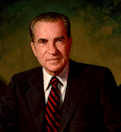 |
Richard M. Nixon |
1969-1974 |
B |
Nixon was born on a lemon farm in Yorba Linda, California, in 1913. He attended Whittier College and graduated from Duke University Law School in 1937. Nixon practiced law in California, and in 1942 moved to Washington, D.C., to work for the federal government. During the Second World War, Nixon served as a Navy Lieutenant Commander in the Pacific theater. A Republican, Nixon was elected to the U.S. Congress in 1946. In 1950 he was elected U.S. Senator from California. Dwight Eisenhower selected Nixon, age 39, as his running mate for the 1952 general election. Nixon was inaugurated U.S. Vice President on January 30, 1953, and served in that capacity until 1961. He was nominated for President by acclamation in 1960, losing the election to Democrat John Kennedy by a very narrow margin. In 1968, Nixon again won the Republican nomination for President, and went on to carry 32 states and defeat Democrat Hubert Humphrey and American Independent candidate George Wallace, who won five southern states. Nixon was inaugurated as U.S. President on January 20, 1969. As President, Nixon's policies included a gradual reduction of forces in Vietnam, the end of the draft, revenue sharing, environmental programs, new anticrime laws, the space exploration program, and appointing conservative jurists to the Supreme Court. On July 20, 1969, NASA astronauts landed the Apollo Lunar Module Eagle on the Moon's Sea of Tranquility. In the summer of 1971, the New York Times published a series of articles, the Pentagon Papers, a collection of secret Defense Department documents about the U.S. policy in Vietnam from 1945 to 1968, given to the newspaper by Daniel Ellsberg, an opponent of American involvement in Vietnam. The Times articles indicated that officials of the Johnson administration and others had repeatedly deceived Congress and the American public in order to justify U.S. policies in Vietnam. North Vietnamese Communists launched a large-scale invasion of the South on March 30, 1972. The South Vietnamese Army fought well and, aided by the strong support of American air and naval forces, was able to crush the invasion attempt. Nixon ran for a second term in the 1972 general election in an effort overseen by the Committee to Re-elect the President (CRP). It was a contentious campaign, marked by dirty tricks and confusion as to who would emerge as the Democrat candidate (early contenders included John Lindsay, Shirley Chisholm, Eugene McCarthy, Humphrey, Wallace, McGovern, and Muskie). On May 15, as Wallace campaigned in Maryland, he was shot by a 21-year-old lunatic. Wallace survived, but was partially paralyzed. Early in the morning of June 17, 1972, Police arrested several men for illegal entry into the offices of the Democratic National Committee (DNC), at the Watergate buildings in Washington, D.C. The DNC, led by Chairman Lawrence O'Brien, was infuriated and sued the CRP, which O'Brien suspected of involvement. In October 1972, Nixon signed the State and Local Assistance Act, a revenue sharing plan that allocated federal funds to the states over a five-year period. Nixon visited China and the Soviet Union in 1972 as a way to reduce the tensions of the Cold War. His meetings with Soviet leader Leonid Brezhnev led to the Anti-Ballistic Missile Treaty. Nixon defeated by a wide margin Democrat candidate George McGovern in the 1972 Presidential election. In January 1973, Nixon announced an accord with North Vietnam to end American involvement in Indochina. On March 29, 1973, the last U.S. combat troops left South Vietnam, as Hanoi freed the remaining American prisoners of war held in North Vietnam. As a result of legal issues (he pleaded nolo contendere to a charge of tax evasion during his tenure as governor of Maryland), Vice President Spiro T. Agnew resigned in October 1973. Nixon nominated and Congress approved House Minority Leader Gerald R. Ford as Vice President. In 1974, Secretary of State Henry Kissinger negotiated disengagement agreements between Israel and opponents Egypt and Syria. The investigation of the 1972 Watergate break-in revealed the men arrested, some ex-CIA operatives, had ties to the CRP. The break-in had been staged by a team led by CRP security director James McCord and ex-FBI agent G. Gordon Liddy to tend to electronic eavesdropping devices surreptitiously installed to record communications of DNC personnel. Several administration officials, including Attorney General John Mitchell, Chief of Staff H.R. Haldeman, Presidential Counsel John Dean, and Presidential Assistant John Ehrlichman, were implicated in the cover-up of the Watergate affair; some were later convicted of related criminal offenses. Nixon denied any personal involvement, but suspicion remained that he had tried to divert the investigation, to protect members of his staff. Facing likely impeachment over the Watergate fiasco, Nixon announced on August 8, 1974, that he would resign the next day to begin a process of healing in America. |
| 38 |
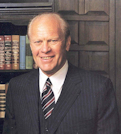 |
Gerald R. Ford |
1974-1977 |
C |
Ford was born on July 14, 1913, in Omaha, Nebraska. Raised in Grand Rapids, Michigan, Ford attended the University of Michigan, where he was a member of the school's championship-winning football team. He later obtained a law degree from Yale University. Ford served in the U.S. Navy 1942-1946 in the Pacific theater, rising to the rank of Lieutenant Commander. A Republican, Ford served in the U.S. House of Representatives 1949-1973. He served in the Warren Commission, which investigated the assassination of President Kennedy, and was House Minority Leader 1965-1973. After Vice President Agnew resigned in 1973, Ford was nominated by President Nixon to take Agnew's position, according with the vice-presidential vacancy provision of the 25th Amendment. Ford was sworn in as U.S. Vice President on December 6, 1973. The following year the Nixon administration faced recriminations and partisan attacks by Democrats incensed over the Watergate break-in and cover-up. When President Nixon resigned on August 9, 1974, Ford became U.S. President, leaving the vice presidency temporarily vacant. On August 20, 1974, Ford nominated Nelson Rockefeller to be the next Vice President of the United States. The next month, on September 8, Ford issued a proclamation giving Nixon a full and unconditional pardon for any crimes he might have committed while President, saying that he felt the pardon was in the best interests of the country. On September 16, Ford issued a proclamation creating the Program for the Return of Vietnam Era Draft Evaders and Military Deserters, a conditional amnesty for military deserters and draft dodgers. After completing a contentious confirmation process, Rockefeller took office as Vice President on December 19, 1974. The economy fell into a recession in 1974, with unemployment rising to 8.9 percent in the second quarter of 1975, and GDP per capita falling at a rate of 3.8 percent. Ford proposed a significant tax cut, and Congress approved enabling legislation by March 1975. Ford's tax cut was targeted at low and moderate income families. It was meant to increase household disposable income and purchasing power, and to stimulate economic growth. To help take the country from the recession, the Ford administration provided unemployment compensation to most unemployed workers. Ford also increased funds for federal programs like the Comprehensive Employment Training Act (CETA), public service employment, and summer youth employment. In 1973, in the aftermath of the Arab-Israeli War, Arab countries proclaimed an oil embargo on nations, like the United States, that supported Israel in the war, triggering a global oil crisis. It the United States, the crisis caused the price of oil products to rise significantly. To counter the oil crisis, President Ford recommended a national energy program designed to reduce dependence on oil imports. The Energy Policy and Conservation Act of 1975 (EPCA) increased domestic energy production and promoted energy conservation. It established the Strategic Petroleum Reserve, the Energy Conservation Program for Consumer Products, and corporate average fuel economy regulations. President Ford's farm policy eschewed federal price controls and relied on non-interference whenever possible. Ford also favored the export of excess produce rather than maintaining surpluses in storage at government expense. During Ford's presidency, net farm income increased by 121 percent over the average during the previous three years. Ford continued Nixon's policy of Detente, aimed at lessening Cold War tensions between the United States and the Soviet Union. Ford was the first President of the United States to officially visit the Soviet Union. In 1974, he visited Vladivostok, a Russian Pacific port city, to meet with Soviet General Secretary Leonid Brezhnev, and signed the Anti-Ballistic Missile Treaty, which helped to contain the Cold War nuclear arms race. President Ford and Secretary Brezhnev signed the Vladivostok Agreement of 1974, which limited the use of strategic armaments. In 1975, the United States entered into an agreement, the Helsinki Accords, with the Soviet Union and European nations, that formally acknowledged the post-World War II European borders and supported human rights. Ford was the Republican nominee for President in the 1976 general election; Robert Dole was his Vice Presidential running mate. Ford lost the 1976 presidential election to Democrat James E. Carter, who carried several midwestern and northeastern states, and all southeastern states, except Virginia and Oklahoma. |
| 39 |
 |
James E. Carter |
1977-1981 |
D |
Carter was born in 1924 in Plains, Georgia. His father was a businessman and farmer. Carter attended the Georgia Institute of Technology in Atlanta, earned admission to the United States Naval Academy in 1943, and graduated with a BS degree in 1946. He went on to serve on submarines until 1953, when he left active service in the Navy with the rank of Lieutenant. Carter inherited his father's peanut-farming business and after initial difficulties managed it successfully. A Democrat, Carter served in the Georgia state Senate 1963-1967. He was Governor of Georgia 1971-1975. Carter sought the Democrat nomination for President in the 1976 general election. He ran an aggressive campaign against a large field of opponents, visiting 37 states, winning the nomination, and going on to win the election with 50.1 percent of the popular vote. Carter was inaugurated as U.S. President on January 20, 1977. As President, Carter's domestic policy emphasized improving education and the environment, and social programs ensuring equal access to opportunity for all. His foreign policy focused on the peaceful resolution of international issues. On August 3, 1977, he signed into law the Surface Mining Control and Reclamation Act of 1977, which regulated the environmental effects of coal mining in the U.S. On August 4, 1977, Carter signed The Department of Energy Organization Act, creating the Department of Energy (DOE). The DOE was tasked with formulating and implementing a comprehensive national energy policy. A 1903 treaty gave the United rights to the Panama Canal Zone. At the time Carter took office, the Panamanian government wanted to assume full control of the Panama Canal. Carter supported the Panamanian position and on September 7, 1977, signed treaties that allowed the United States the right to defend the Panama Canal from threats to its continued service, and gave Panama the full control of the canal after 1999. On October 24, 1978, Carter signed into law the Airline Deregulation Act, which removed government control over such areas as fares, routes, and market entry of new airlines. It resulted in an increase in the number of flights, a reduction of fares, and a lower quality of service. Carter worked to mediate the persistent Arab-Israeli conflicts. In 1978, he invited Egyptian President Anwar Sadat and Israeli Prime Minister Menachem Begin to the presidential retreat at Camp David, leading to the two leaders signing the Camp David Accords at the White House. The Camp David Accords included A Framework for Peace in the Middle East and A Framework for the Conclusion of a Peace Treaty between Egypt and Israel. An Egypt-Israel Peace Treaty was signed on March 26, 1979. Carter's economic policies faced persistent high inflation, high unemployment, and stunted growth. His support of busing schoolchildren to achieve racial integration became widely unpopular. On October 17, 1979, Carter signed the Department of Education Organization Act, which split the Department of Health, Education and Welfare into the Department of Education and the Department of Health and Human Services. The end of Carter's term in office was marked by the 1979 energy crisis and the Nicaraguan Revolution. When the Soviet Union invaded Afghanistan, Carter ended the Detente, imposed a grain embargo on the Communists, and boycotted the 1980 Moscow Olympics. On November 4, 1979, 52 United States diplomats and citizens were taken hostage after a group of Islamic militant supporters of the Iranian Revolution took over the U.S. Embassy in Tehran. The hostages were held for 444 days, until the end of Carter's term in office. On December 2, 1980, Carter signed into law the Alaska National Interest Lands Conservation Act. The Act doubled the amount of public land set aside for national parks and wildlife refuges. Carter also established the Superfund through the Comprehensive Environmental Response, Compensation, and Liability Act of 1980. The Superfund is a federal government program designed to enable the cleanup of sites contaminated with hazardous substances and pollutants. Carter lost the 1980 presidential election in a landslide to Republican nominee Ronald Reagan. |
| 40 |
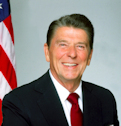 |
Ronald W. Reagan |
1981-1989 |
A |
Reagan was born February 6, 1911, in Tampico, Illinois. His family moved to Dixon in 1920. Reagan graduated from Dixon High School, where he was student body president and performed in school plays. He graduated from Eureka College in 1932 and worked as a radio sports commentator in Iowa. Reagan moved in 1937 to California, where worked as an actor until 1964. He appeared in over 60 movies, starring in several major productions, including King's Row and Knute Rockne All American. Reagan served in the Army Reserve 1937-1942, and the Army Air Force 1942-1945, attaining the rank of Captain. He served as president of the Screen Actors Guild 1947-1952 and 1959-1960. In 1953, Reagan began to appear in television programs such as The Ford Television Theatre and Death Valley Days. A Republican, Reagan spoke on behalf of presidential nominee Barry Goldwater's 1964 campaign. Reagan's charismatic speeches won him national attention as an influential conservative figure, and he sought and won the Republican nomination for Governor of California. Reagan won the 1966 election and served as Governor of California 1967-1975. In 1976, Reagan ran for the Republican Presidential nomination, narrowly losing to incumbent President Gerald Ford. Reagan again sought the Republican Presidential nomination in 1980, and won the nomination and the election, in which he carried 44 states. He was inaugurated U.S. President on January 20, 1981. Reagan's policies as President included cuts in domestic federal spending, tax reduction, reduction in federal regulations, encouragement of private enterprise and free trade, limiting the influence of Communist nations, and increased military capabilities. In his inaugural address, Reagan reported that all American hostages held in Iran were being released immediately and were returning to freedom. Reagan's economic philosophy held that low taxation increased business investment and personal expenditures, encouraging economic expansion, which increased government revenue at a lower tax rate. Increases in revenues could be used to fund prioritized budget items, such as the military, federal debt reduction, and national infrastructure. On March 30, 1981, a deranged fan of actress Jodie Foster attempted to assassinate President Reagan. The President was seriously injured, but recovered. On August 13, Reagan signed The Economic Recovery Tax Act of 1981, a major tax cut designed to encourage economic growth. In September, Sandra Day O'Connor was sworn-in, the first female Supreme Court Justice. On May 1982, the United States and the Soviet Union announced the Strategic Arms Reduction Talks (START), which would reduce the strategic nuclear arsenals. On March 23, 1983, Reagan announced the Strategic Defense Initiative (SDI) program in a national television address. SDI was designed to replace the Cold War policy of Mutual Assured Destruction with the ability to destroy strategic ballistic missiles before they reached U.S. soil or that of our allies. SDI's first layer of defense against ballistic missiles would be space-based, using surveillance satellites for early detection of missiles when launched and directed-energy weapons to destroy them. A layer of ground-based radars and interceptors would destroy warheads that evaded destruction in space. On October 23, 1983, truck bombs struck buildings in Beirut, Lebanon, housing American and French military peacekeepers during the Lebanese Civil War, killing 307 people, including two terrorists linked to Iran, Syria, and Hezbollah. Initial uncertainty about the culprits delayed a response until February 8, 1984, when the USS New Jersey shelled Druze and Syrian positions in the Beqaa Valley east of Beirut. Responsible terrorists were eventually identified and hunted down. In 1979, the Communist New Jewel Movement seized power in the Caribbean Island of Grenada in a coup d'etat led by Maurice Bishop. Then in September 1983, a power struggle between Bishop and Deputy Prime Minister Bernard Coard escalated to an armed conflict that by October 19 had claimed 19 lives, including Bishop's, and involved Cuban and Grenadian troops and Soviet, Libyan and East German advisors. The U.S. received appeals for help from the Organisation of Eastern Caribbean States and from relatives of over 600 U.S. medical students stranded on the island. Reagan ordered U.S. military forces to take control of the island and restore order. Operation Urgent Fury, October 25-29, 1983, involved elements of U.S. Marines, Army, Delta Force, and Navy SEALs, Jamaican troops, and members of the Caribbean Peace Force. Order was restored by the end of October, the students and political prisoners were freed, and Communists were expelled. Governor-General Paul Scoon assumed power as interim head of Grenada's government and organized 1984 elections resulting in a government led by Prime Minister Herbert Blaize. Reagan announced his candidacy for re-election January 29, 1984. Reagan traveled to Beijing, China, in April 1984. Discussions with Chinese President Li Xiannian included commercial nuclear power and Taiwan. In November, Reagan won a second term in a landslide victory (525-13 in Electoral College). Reagan met with Mikhail Gorbachev, the General Secretary of the USSR Communist Party, at the November 1985 Geneva Summit. He addressed Congress November 21 on the Summit's "Fresh Start." On December 12, 1985, Reagan signed the Gramm-Rudman-Hollings Act, imposing binding spending constraints on the federal budget. The La Belle nightclub in Berlin was bombed on April 5, 1986, killing three, including a U.S. serviceman, and injuring 229 people. West Germany and the U.S. obtained evidence tracing the bombing to Libyan agents in East Germany. In retaliation, the U.S. carried out air strikes on Libya using Air Force, Navy and Marine Corps aircraft. On September 26, 1986, William Rehnquist and Antonin Scalia were sworn-in as Chief Justice and Justice of the Supreme Court. On October 11-12, 1986, Reagan met at Reykjavik, Iceland, with Gorbachev. The two did not reach an agreement, but the progress they achieved eventually led to the 1987 Intermediate-Range Nuclear Forces Treaty. In October 1986, Reagan signed the Tax Reform Bill, and in November the Immigration Reform and Control Act. In April 1987, Congress approved the transfer of the United States interest in the common stock of the Consolidated Rail Corporation (CONRAIL) to the private sector. On June 12, 1987, during a visit to Berlin, Reagan spoke outdoors at the Brandenburg Gate referring to the wall separating East and West Berlin, saying "Mr. Gorbachev, tear down this wall!" The U.S.-Canada Free Trade Agreement was signed in Palm Springs on January 2, 1988. In 1988 Reagan completed work on several domestic programs, signing the Medicare Catastrophic Coverage Act, the Trade and Competitiveness Act, the Family Support Act, and the Anti-Drug Abuse Act. The Iran-Contra Affair related to U.S. policy toward two countries that underwent revolutionary regime change in 1979, Iran and Nicaragua. In Iran, Islamic extremists led by Ayatollah Ruhollah Khomeini adopted a militant anti-U.S. posture after toppling the pro-Western government of Shah Mohammed Reza Pahlavi. In Nicaragua, the leftist Sandinistas had taken power from Anastasio Somoza. In the early 1980's the U.S. government provided military aid and financial support for Nicaraguan opponents of the Sandinista regime, the counterrevolutionaries (contras). In 1984, the Democrat-led Congress passed legislation (the second Boland Amendment) that banned U.S. military aid to the contras. In 1985 and 1986, the head of the National Security Council (NSC), Robert McFarlane, undertook the sale of weapons to Iran. A portion of the $48 million that Iran paid for the arms was diverted by the NSC and given to the contras, together with funds obtained from other sources. The monetary transfers were undertaken by NSC staff member Lt. Col. Oliver North with the approval of McFarlane's successor as head of the NSC, Vice Adm. John Poindexter. North and his associates also raised private funds for the contras, and the transfer of arms and other materials to the contras was overseen by retired Air Force Major General Richard Secord. These activities allegedly violated the Boland Amendment, and Democrats in Congress were incensed that the NSC had participated in a scheme to countermand the Amendment. In 1987, Senate and House Select Committees conducted investigations into the affair. Although no one went to jail, the investigation was a source of embarrassment for the Reagan administration. During Reagan's 8-year term in office, inflation rate was reduced from 10 percent in 1981 to 5 percent in 1989, unemployment went down from 8.5 percent to 5.4 percent, and Gross Domestic Product annual growth rate increased from 2.5 percent to 3.7 percent. |
| 41 |
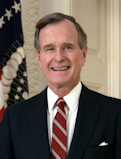 |
George H. Bush |
1989-1993 |
C |
George Herbert Bush was born in 1924 in Milton, Massachusetts. His parents were Prescott Bush and Dorothy Walker. Bush attended Yale University in New Haven, Connecticut, and graduated in 1948 with a Bachelor of Arts degree in Economics. He served in the U.S. Navy 1942-1955. A naval aviator, Bush served in the Pacific theater during World War II and was awarded the Distinguished Flying Cross. He left active service in the Navy with the rank of Lieutenant. In 1948 Bush moved to Texas, where he worked for Dresser Industries, a company with interests in energy and natural resources. With partner John Overbey, Bush started the Bush-Overbey Oil Development Company in 1951. In 1953 Bush co-founded the Zapata Petroleum Corporation, a company in the oil drilling business. A Republican, in 1964 Bush was a contestant for the U.S. Senate, but lost to Democrat Ralph Yarborough. In 1966, Bush ran for the United States House of Representatives in a congressional district in the Houston area. He served in the U.S. House of Representatives 1967-1971 and was U.S. Ambassador to the United Nations 1971-1973. Bush was Director of Central Intelligence 1976-1977. When Carter took office as U.S. President, he dismissed Bush as CIA Director. Bush then led the executive committee of the First International Bank in Houston and worked part-time as Professor of Administrative Science at Rice University. Bush sought the Republican nomination for President in the 1980 general election, but lost the primary to Ronald Reagan. He ran for the Vice-Presidency in the general election and served as Vice-President during Ronald Reagan's Presidency 1981-1989. Bush entered the 1988 Republican presidential primaries in October 1987. He won the nomination, prevailing over opponents Senator Bob Dole, Congressman Jack Kemp, and Christian evangelist Pat Robertson. In the general election, Bush easily defeated Democrat candidate Michael Dukakis. Bush was inaugurated as U.S. President on January 20, 1989. Reagan's policies had deeply undermined the Soviet Union, and as Bush took office the General Secretary of the Communist Party, Mikhail Gorbachev, emerged as a reformer favoring democracy. When Communist governments in Eastern Europe collapsed, Gorbachev did not send Soviet troops to support embattled Communist functionaries. However, Gorbachev used force to suppress nationalist movements within the Soviet Union. In December 1989 Bush and Gorbachev met at the Malta Summit, where negotiations started that led to a reunification of Germany in October 1990. In July 1991, Bush and Gorbachev signed the Strategic Arms Reduction Treaty (START I), in which the U.S. and the U.S.S.R, agreed to reduce strategic nuclear weapons by 30 percent. In August 1991, hard-line Communists attempted to overthrow Gorbachev. The coup d'etat failed, but diminished Gorbachev's power and the Soviet central government, and led to Gorbachev resigning his General Secretary post. Russian President Boris Yeltsin then ordered the seizure of Soviet property. Gorbachev held on as President of the Soviet Union until December 1991, when the Soviet Union was dissolved. The U.S.S.R. broke up into fifteen states, of which Russia was the largest in area and population. Bush and Yeltsin met in February 1992, hopefully declaring a new era of friendship and partnership. In January 1993, Bush and Yeltsin agreed to START II, which added further nuclear arms reductions to the first START treaty. In May 1989, Panamanian President Manuel Noriega annulled the results of a presidential election in which Guillermo Endara had been elected. Bush objected to the annulment of the election and questioned the status of the Panama Canal under the new Noriega regime. Bush dispatched 2,000 soldiers to Panama, where they conducted military exercises. When an American serviceman was shot by Panamanian forces in December 1989, Bush ordered the invasion of Panama, Operation Just Cause. American forces rapidly took control of the Canal Zone and Panama City. Noriega surrendered on January 3, 1990, and was taken to a prison in the United States. He was convicted in April 1992 and imprisoned on racketeering and drug trafficking charges. American losses in the operation were 23 dead 394 wounded. In August 1990, Iraqi President Saddam Hussein invaded Kuwait, a small, oil-rich country in northeastern Arabia, on Iraq's southern border. The Iraqi invasion posed a threat to Saudi Arabia and the entire Persian Gulf region. President Bush imposed economic sanctions on Iraq and assembled a coalition of nations opposed to the invasion. In November 1990, the United Nations Security Council approved a resolution authorizing the use of force if Iraq did not withdraw from Kuwait by January 15, 1991. The U.S. Congress approved the use of military force Against Iraq in 1991. Iraqi forces did not withdraw by the deadline, and U.S.-led coalition forces started air attacks against Iraq power and communication centers, followed by a successful ground attack on February 23, 1991. A cease fire was arranged on March 3, and the United Nations established a peacekeeping force in a demilitarized zone between Kuwait and Iraq. Approximately 300 Americans and 65 soldiers from coalition nations died during the military intervention to liberate Kuwait. The North American Free Trade Agreement (NAFTA) between the United States, Mexico and Canada was signed in December 1992. It lowered tariffs and regulated patents, copyrights, and trademarks. The United States slipped into a mild recession in 1990. The unemployment rate rose from 5.9 percent in 1989 to a high of 7.8 percent in mid-1991. As Federal deficits rose from $152.1 billion in 1989 to $220 billion in 1990, the public became increasingly worried about the economy. Bush was a pragmatic president, without adherence to a core unified governing philosophy. Despite a degree in Economics, he failed to effectively counter the slogan "it's the economy stupid" touted by his political opponents during the economic downturn affecting his term. Bush lost the 1992 presidential election to Democrat William J. Clinton. |
